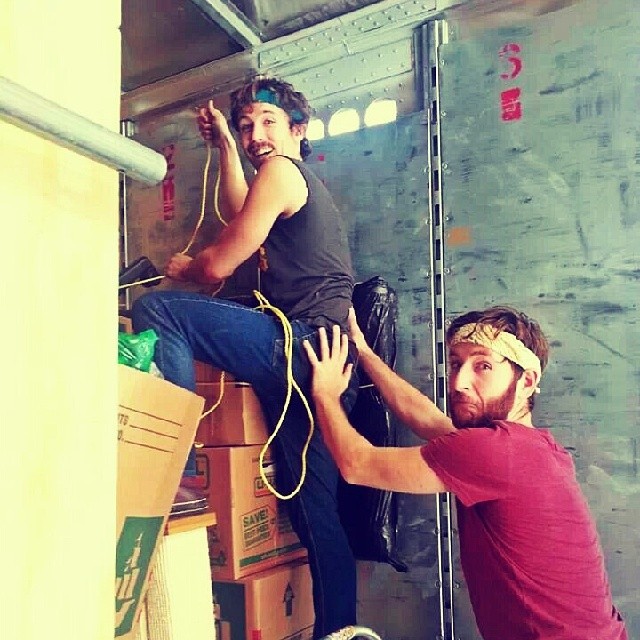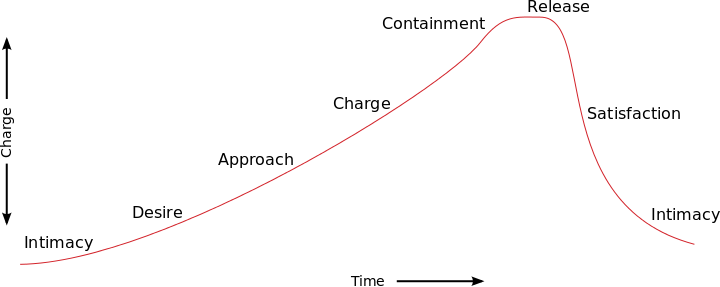I had the distinct honor of being part of the expert’s “mix and meet” at the first annual Sexual Health Expo, and it was my pleasure to offer you an AMA during this event! I received so many great questions, and it was a treat answering them for you!
Please note that while I do indeed offer therapy, this AMA is not therapy. It is intended for your education and enjoyment only.
“What do you do to get past the edge when you can’t?”
This depends largely on just where you’re getting stuck. There are three stages of the orgastic cycle that are at play here: charge, containment, and release. Orgasms are a release of built up muscular tension (charge). When enough tension is built and sustained, an orgasm is forthcoming.
So first off, factors such as fatigue or intoxication must be ruled out. Then consider if enough charge is being built. Sometimes we can become over-focused on a fantasy and get drawn too far from awareness of the body. Shifting focus to sensation can build more charge. There are also positions that are especially good for building charge, particularly ones which allow the quadriceps to be engaged. (This is why some people flex those muscles during sex.)
Sometimes the biggest challenge is allowing yourself to be vulnerable enough to orgasm. You have to feel safe and comfortable enough to jump off, because it is pretty darn vulnerable to allow another person to see and hear you in that space. If you have a sense that this is what’s holding you back, there are many paths that you can take, and all involve introspection. You can practice masturbating in front of a mirror in order to get used to what you look like during orgasm. Notice what you like, and what you don’t like, and spend some time reflecting upon why for each. You should consider your partners. Do you genuinely like them? Do you feel safe with them? If you stay stuck, seek the support of a therapist.
“Do white guys do the best at cunnilingus?”
In short, no. But perhaps that’s been the case in your experience. If you’d like to say more about why you’re asking, feel free to email me or leave an anonymous comment below.
I did some research into cultural perspectives on cunnilingus, but I haven’t come up with anything substantial as of yet. I have noticed that there seem to be stronger opinions about fellatio than cunnilingus, which is interesting.
“How do you start to be comfortable with anal sex even though you cringe at the thought?”
Well, it matters a lot that you are genuinely interested in it. The sexual activities that we enjoy are ultimately no more complicated than our food preferences. There are just some things we like, and some we don’t. So make sure you’re approaching this from the standpoint that it may not be for you. That would be ok! Then consider what your blocks may be. Anal sex, probably more than any other sexual act, can be pretty tangled up in false beliefs, and you may need to process through some thoughts and feelings. That can take a lot of exploration and communication, so be patient with yourself and your partner, if you have one. Once you decide if you genuinely want to try it, seek out educational resources that will guide you through the process. The Ultimate Guide to Anal Sex for Men, The Ultimate Guide to Anal Sex for Women, and The Adventurous Couples Guide to Strap-On Sex from Cleis Press are all excellent.
“What does somatic sex therapist mean? What degree did you get?”
Check out my “Home” and “About Heather” pages to learn about my background. In some ways, specifying somatic therapy and sex therapy is redundant, because it’s all about the complete person. One’s sexuality is simply a clear way to see into their inner landscape. We are good at certain things, and we get stuck on certain things, and when you understand how the body is organized around those qualities, you will see the same enactments in all areas of a person’s life. If the realm of somatics seems a little elusive, you might like this article.
“Can you have anal sex with an exterior hemorrhoid?”
It’s possible, but this is a question that should first be answered by your doctor, so that your exact physical condition can be considered. I like this article from urologist Dr. Joe DeOrio. He addresses both what’s happening physiologically, and raises some important considerations about the question itself.
“Is oxytocin released when you touch yourself or only when someone else does?”
Oxytocin is released during and after any orgasm. Isn’t that cool? Check out Susan Kuchinskas’ book The Chemistry of Connection if you want to learn all about this amazing hormone.
“What is cunnilingus?”
In short: awesome. Cunnilingus is oral stimulation of the female genitalia. There is a wealth of excellent information about it out there, from books to instructional videos. For curated resources, take a peek at my resources page.
“What are some people so afraid of STIs? Most are very curable. Some people kill themselves with food, smoking, alcohol or skiing?”
I suspect that the answer has to do with the higher presence of shame and embarrassment when it comes to sexual considerations. Generally speaking, we are more private about our genitalia than we are about the rest of our bodies. Some of us even call them “private parts.” And injuries in particular are much more difficult to tolerate when they affect the genitalia. Even with fully curable STIs, one still has to deal with the negative impact on an especially sacred part of the body.
If you’ve been struggling with this personally, it would probably be very useful to explore how you talk to others about your STI. Effective communication is paramount. In conversations with potential sexual partners, make sure that you don’t brush off their concerns by being too relaxed. That can just heighten their fears. You will best assuage their worry through empathy and education.
Your question invites an exploration that I think is pretty important. It can be very difficult to teach children about the sacredness of sexuality without creating a culture of secrecy, which can breed shame. Privacy and secrecy are quite different.
“How many licks does it take to get to the center of a cock-pop (or cunt)?”
Well, I’ll tell you one thing. Please don’t stop at three and then bite. Unless she’s requested that you do, of course.
“What % of heterosexual women have bisexual and/or lesbian fantasies?”
This depends on the particular research experiment, of course, but if we just lump together any fantasy involving a woman had by a heterosexual woman, the average seems to land between 30 and 40%. Bisexual or homosexual fantasies are both normal and common, for persons of any gender. And they don’t always mean anything about one’s ultimate sexual orientation.
Here are a few studies that you might find interesting (you may need to hit up a grad student friend to access the full journal articles):
- Was it a phase? Young women’s relinquishment of lesbian/bisexual identities over a 5-year period.
- “Mostly straight” young women: Variations in sexual behavior and identity development.
- Female bisexuality from adolescence to adulthood: Results from a 10-year longitudinal study.
“Do you think that hand-written love letters are a dying art?”
I most certainly do! Rather, I believe that it’s on the decline. But hand-written anything has been on the decline for some time, and I don’t think it will even actually die out. We like tactile, non-verbal, and non-digitized things far too much for this to be the case. Look at the explosion of Emogis, for instance. The more we text, the more we want and need to include images to fill in the gap left by removing all those non-verbal goodies. Language can be limiting enough without subjecting it to the generic nature of typed text. Of course, you did ask a person who choose a profession that is rooted in deeply intimate interactions!
“What do you do if you get jaw locks as you’re giving your man blowjobs?”
This depends on what’s causing the locks. A jawlock is the body’s way of saying no. So ask yourself if you’re just wearing yourself out, or if there may be a psychological cause. If you sense that psychological factors may be at play, then it’s important to take a step back from the situation and consider what you’re feeling. I encourage you to allow this process to be supported by a therapist with whom you are comfortable. If it seems to be strictly the former, there are lots of physical techniques to make fellatio easier. To start, know that you don’t have to be thrusting him into your mouth and throat over and over for the whole performance. Variety is key, and most men really enjoy this, as it can really build up a lot of charge. Use your hand to stimulate the base, or even his scrotum and perineum if that’s something he enjoys. You can also use your tongue to stimulate just the more sensitive parts of his penis without having it fully in your mouth. You can even stick your tongue out between your teeth, giving your jaw a solid rest. There are some excellent books out there, such as Violet Blue’s Ultimate Guide to Fellatio. If you’d like some in-person coaching, Sex Nerd Sandra often teaches free classes on fellatio at The Pleasure Chest.
“How do I become a sex therapist?”
Fun, you want to be a sex therapist? Lemme tell ya- it’s a wonderful career. There is both simplicity, and infinite complexity.
If you haven’t been a client of sex therapy, start there. You absolutely must know what the work is like. Then you can begin to decide just what you’d like to do in your own career. What fuels you? What population would you like to work with? For example, I have a psychotherapy practice wherein sexuality is a specialty. But there are sex therapists who deal more in education and technique than with psychological exploration. These are hugely overlapping realms, but knowing how you’d like to spend most of your time will guide you in finding the appropriate education.
You might start with checking out what AACAST, AASECT or the Institute for Advanced Study of Human Sexuality (IASHS) have to offer. Talking to graduates can be a great way to see if a particular program a good fit.
“Does anal sex make a woman’s gluteus maximus larger?”
Not directly. If the positions you use are working those muscles or you tend to flex them during sex, then you may be doing some strengthening. But anal sex does not automatically engage the gluteus maximus, and this goes for individuals of any gender.
“What’s the best way to get my wife to try a vibe?”
You’re an awesome partner for asking this question! Vibrators can be the source of so much pleasure. I have known several women who never orgasmed before they used one. First of all, make sure that the two of you are on the same page. Does she want to try one? And why would you like her to? If she doesn’t want to try one, you can respectfully ask her why. The “why nots” are almost always the source of the answers to this sort of question. Make sure that you create a safe environment for her to answer. Be warm, curious and non-judgmental. She has a reason for her hesitation that makes sense to her, so join her in that before you try to pull her somewhere else. Perhaps she’s tried one and found it overstimulating or understimulating. Maybe she associates vibrators with something unpleasant, like abuse or a negative belief about masturbation. If you’re male, maybe she’s embarrassed that you’re “ahead” of her on this. Once you’ve established solid same-pagedness, then you can start your human-vibrator calibration. Informed sex stores (including those online) offer information about the typical sensations of different toys, and how/ when to use them. Check out my resources page for a list of recommended places to shop.
“I think I was sexually abused, but I don’t know. What should I do?”
Find a therapist that you click with. If this is a question that continually plagues you, you are likely to get a lot of relief from addressing and processing it with support. It will indeed require you to face some uncomfortable feelings, but it will not be like reliving them. Sexual abuse is too big to hold by yourself, and you deserve to be free from this. And remember that you are you, no matter what you discover in the process. Often what we think abuse looks or feels like is quite different from the reality of the experience. All of our experiences shape us.
“What is the procedure to prepare for anal sex?”
I’m guessing that this means that you are ready to try, and I think that’s awesome! Preparations and execution can be different depending on what type of parts you have and your particular body’s needs, but here’s the relatively universal stuff:
-Have a whole lotta lubricant. And no skimping- your body deserves clean, high-quality lube. If you’re using a toy, make sure that your lube is compatible with your toy’s material composition (silicone and silicone don’t get along, for instance). And expect to be surprised by how much you need! I’m a fan of keeping it in a container with a pump for easy access.
-Evacuate your bowels. You want that rectum free and clear to play in! Some people recommend douching, but this isn’t necessary for comfort as the rectum only contains feces just prior to a bowel movement.
-Relax, especially if you’re on the receiving end. There’s a reason we call some people “anal retentive.” The anus closes right on up when the body is tense, and sometimes just because. It’s a lot like a cat. You really can’t predict what it’s going to do. You can only attend to it as needed.
-Keep everything clean and contained. Traces of feces are often left in the rectum (even after douching), and it can cause infection or illness if transferred into any other openings.
-Communicate. And keep communicating. Anal sex should never be painful, so stay on the same page by speaking up, checking in, and trying new positions, angles and rhythms.
I recommend that you get yourself a couple of books. The Ultimate Guide to Anal Sex for Men, The Ultimate Guide to Anal Sex for Women, and The Adventurous Couples Guide to Strap-On Sex from Cleis Press are all excellent.
Have super amounts of fun! It’s wonderful to expand your sexual toolbox, and I hope that you very much enjoy your first experience.
“Is female ejaculate pee? All pee? Some pee?”
Actually, the jury is still out on just what makes up female ejaculate. We do know that it’s not just urine, but urine does show up fairly regularly in studies. Female ejaculate seems to come from the Skene’s glands, which are surrounded by tissue that swells with blood during arousal. These glands drain into the urethra, so we’d expect to find some bladder fluid in the mix.
I think it’s pretty cool that this fascinates us, and that it has for such a long time. In the 16th century, Dutch physician Laevinius Lemnius referred to how a woman “draws forth the man’s seed and casts her own with it.” A little heteronormative, Lemnius, but I commend you for being interested! I assume Mrs. Laevinius Lemnius was a pretty satisfied gal.
“Does attraction mean sexual attraction, or are there different types of attractions?”
Yes, I believe that there are indeed different types of attraction, with each sharing in common the experience of being pulled to something. What you’re pulled toward or in need of defines the type of attraction.
I believe that this is a conversation that is nearly synonymous with the theories on the different types of love. There are six types of love according to ancient Greek wisdom: agape, eros, ludus, mania, pragma and storge (categorization and terms vary a bit). The Wikipedia page on these has a nice little synopsis.
Psychologist Robert Sternberg proposed that there are components of love: intimacy, passion, and commitment. This triangular model gives you seven different types of love, depending on the particular combination of these elements.
I imagine that my answer may fall short of what you’re particularly interested in, so I’ll offer this: If you’re struggling with the types of attractions people have to you (as with “nice guy syndrome”), then consider your sexual archetypes and what blocks you may have to embodying them. Chelsea Wakefield’s book, Negotiating the Inner Peace Treaty, is a great resource for this exploration.
“Is it possible to have the feeling of a ‘phantom limb’ even if it was never ‘lost?’ I feel like I have, or should have had a penis & when it’s aroused it’s extremely frustrating because I am biologically female, so stimulating myself even to completion doesn’t help. It feels like a different part of me. Sometimes, mentally fantasizing helps.”
It is indeed possible. It’s a condition called a “supernumerary phantom limb.” This is one of those things that makes the body-mind connection so very apparent. It seems that phantom limbs are caused by what is essentially a mapping issue in the brain. There have been many successful experiments in which subjects are put through exercises which “rewire” their cognition, and the phantom sensation diminishes or disappears, or the subjects were able to gain control of its action (which is probably what you’re needing). The usual course of treatment involves creating an optical illusion wherein a subject with a missing limb perceives two limbs before them. The existing limb is stimulated or the subject is asked to move it, and the illusion creates the perception of sensation in the phantom limb. Similar experiments have been done with subjects who have no missing parts! The brain is powerfully adaptable!
Since you said that mentally fantasizing is sometimes helpful, I feel a lot of hope for you that you can successfully do some re-mapping of your own. If you haven’t already, you might try getting a strap-on to wear while you masturbate, or simply while you fantasize. It could give your arousal a physical place to land, and then you can do with it what you please. The kind of strap-on that vibrates or rubs against you in a pleasant way, or a double dildo is probably what you want in order to have enough physical stimulation. If you have a male partner, you could do a little “reverse cowgirl” straddle so that his penis is visible between your legs as if it were your own, and then stimulate yourself and him at the same time. I’m betting that you’d need to repeat these experiences many times. Masturbating in a new way isn’t the worst homework ever, eh?
You might consider creating a relationship with a neurologist who will run some experiments with you. I’d be very happy to help you find someone here in Los Angeles, as well as to support you through this. Don’t hesitate to call or write. And keep me updated, if you’re comfortable doing so.
“When/where does one draw the line between reclaiming sexual freedom & expression, and when is one re-enacting trauma? Trying to figure out promiscuity!”
Great question. I believe that the answer is extremely dependent on the person, but can be pretty easily found by tuning into the body. Ultimately, your body knows what’s up. You just have to listen. Freedom and open expression are exhibited through relaxed muscles, deep breathing, a sense of groundedness, awareness of what’s happening in the moment, etc. In regards to sex, do you feel authentic most of the time? Does the sex bring a feeling of lasting satisfaction? People who are re-enacting trauma exhibit symptoms of it, such as shortness of breath, increased heart rate, chronic muscle tension, chronic nervous system hyperarousal, extreme cold, etc. It’s also common for someone who is unhealthily promiscuous to feel dettached, disgusted, disocciated, shameful, etc. directly after orgasm or the next day. Such a person is likely re-enacting negative experiences, and the healing process for them would likely be to feel safely vulnerable in deep intimacy. It’s not always easy to track what’s happening in your body in each moment; you may need and enjoy the support of a therapist. If you’d like to aid your exploration with some reading on this topic, treat yourself to The Ethical Slut by Dossie Easton and Janet Hardy.
“Why do women feel more connection after sex than before? And why is the connection more intense with women than men?”
Hormones, baby, hormones! Oxytocin is released in the bodies of any gendered person both during and after sex, and it’s role is to increase intimacy and bonding. (It actually does all kinds of kick ass stuff, and I highly recommend Susan Kuchinskas’ book The Chemistry of Connection if you’d like to read up on it.) But there is a slight difference between males and females. Males also release vasopressin, a hormone that differs from oxytocin by only two amino acids. Vasopressin actually activates some get-up-and-go (which is believed to be about protection, not about running away from intimacy), where oxytocin stimulates more snuggly, nesty feelings.
If you’re finding that you and your partner(s) differ in terms of what you want in your post-coital time, I suggest that you communicate your individual needs in order to find something that works for each person. It doesn’t have to be a big deal that your desires are different, but because this is such a vulnerable space, it can bring up a lot of past issues around invasion or abandonment. Be specific about what you want and why so that you can get on the same page.
“Is there any way a woman would ever notice a testicular cyst?”
Yes, I do think this is possible. Many scrotums like to be played with, so if you find yourself with a woman who takes it upon herself to stimulate yours, then she could certainly notice. But what you’re feeling about this is probably more important, and the truer aim of your question. If you haven’t already sought the help of a medical professional, do so immediately. But if you already know all the facts about what’s happening in your body and the cyst isn’t removable or you just want to know how to handle sex before its removal, then I encourage you to take steps to feel more relaxed about this. Arousal and orgasm is greatly aided by muscle relaxation, so it would go a long way for your enjoyment if you weren’t preoccupied with imminent cyst discovery. A lot of women wouldn’t be bothered by a cyst as long as it’s not bothering you. Try telling them about it before your sexy time. You can also let your partners know that you don’t enjoy having your scrotum touched, or that you don’t enjoy having certain parts of it touched. They’ll likely appreciate your openness about this.
“Why are some women nervous of blowjobs? What are they afraid of?”
It depends on the individual. There are obvious cases where a person has had a bad experience with fellatio, whether in an abusive situation or not. Some people associate it with degradation, which is unfortunately too often perpetuated by media portrayals. Others don’t care for the taste or the texture of semen, but don’t want to ask you to warn them before you ejaculate (and to those folks I say find a way to get comfortable communicating this). Others aren’t sure what to do, and don’t want to disappoint. Some people purport to simply not enjoying it. One of my question askers gets jaw locks (see my answer to those). And there are probably infinite reasons beyond that.
If you’re in a relationship with a woman who’s nervous about this, start by acknowledging her fear. Be non-judgmental, and help to make it easy for her to share what she’s experiencing. Then get a little vulnerable and tell her what you’d like about having her go down on you. In the case of a person who considers it degrading, it could go a really long way to hear how you actually see it. A lot of men feel quite vulnerable when receiving a blowjob. Your penis is in a mouth, after all! There are teeth in there! She might really like to hear that from you. But whatever her hesitation, successfully communicating to her what you would like- and making it a gentle request- is likely to go a long way.
Thank you all for being willing to ask me your intimate questions. It is my pleasure to support you. If you do not see your question listed, please shoot me an email. Two of the questions were not legible.






